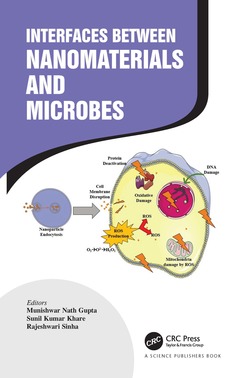Interfaces Between Nanomaterials and Microbes
Coordonnateurs : Gupta Munishwar Nath, Khare Sunil Kumar, Sinha Rajeshwari

Nanomaterials are becoming ubiquitous; microbes similarly are everywhere. This book focuses on various ways the diverse nanomaterials interact with microbial communities and implications of such interactions. Both toxicity and beneficial effects of nanomaterial-microbe interactions have been covered. This includes areas such as fate and bioavailability of nanomaterials in environments, microbial synthesis of nanomaterials and antimicrobial action of nanomaterials. Fairly comprehensive but with narrow focus, the book provides useful insights into these interactions which need to be factored in while designing nanoscience based new technologies.
Introduction to the Microbial World. An Overview of Interactions between Microorganisms and Nanomaterials. Interactions of Metal-Containing Nanomaterials with Microorganisms. Challenges in the risk assessment of nanomaterial toxicity towards microbes. Nanocrystalline Cellulose (NCC) Composites with Antimicrobial Properties. TiO2 Nanoparticles and Composite Materials: Antimicrobial Activity, Antimicrobial Mechanism and Applications. Appraisal of organic and inorganic nanomaterials in cellular micro environment. Microbial Synthesis of Nanoparticles and Their Applications. Microbial Synthesis of Nanomaterials and Their Biotechnological Applications. Biosynthesis of Metallic Nanoparticles by Extremophiles and Their Applications. Synthesis and Biological Applications of Greener Nanoparticles. Liposomal Delivery: a Powerful Tool to Promote the Efficacy of Antimicrobial Agents.
Munishwar Nath Gupta taught chemistry, biochemistry and biotechnology at IIT Delhi [1975-2018]. He received his PhD degree from the Indian Institute of Science, Bengaluru, and was a post-doc at University of Minnesota [USA], MIT [USA], Lund University [Sweden] and UTC [France]. He was a national science talent scholar and is a fellow of both National Academy of Sciences, Allahabad and Indian National Science Academy, New Delhi. He has > 300 publications with h-index of 57.
Sunil Kumar Khare is Dean (R&D) and Chair Professor of Biochemistry at IIT Delhi. He received Ph.D. in Biochemistry from IIT Delhi and Postdoc at NFRI, Japan. His research is focussed on Extremophiles, Extremozymes, Nanobiocatalysis, and Nanotoxicity. He has published >165 research papers and 20 chapters. He has been visiting faculty at Polytech Blaise Pascal, France, NCAUR Peoria, USA. He is fellow FRSC, FBRS, FNAAS, FAMSI, and serves as Associate Editor for 3 Biotech and Member for Frontiers Bioengineering Biotechnology and BMC Biotechnology.
Rajeshwari Sinha received PhD from IIT Delhi in 2015, where her work focused on bacterial toxicity and biocatalysis aspects of nanoparticles. She has since been working at the science-policy interface in the health space. As an independent researcher, she uses scientific training to synthesize knowledge and develop solutions on issues impacting human health. She has published her work in reputed journals, and also writes in media platforms. Dr. Sinha is also an alumna of IIM Calcutta.
Date de parution : 06-2023
15.6x23.4 cm
Date de parution : 06-2021
15.6x23.4 cm
Thèmes d’Interfaces Between Nanomaterials and Microbes :
Mots-clés :
Biosynthesis of nanoparticles; Microbial synthesis of nanoparticles; Bionanosynthesis; Nanotoxicity; Bio-nanointeractions; Bio-nanointerfaces; Nanoparticles as antimicrobials; Bioavailability of nanoparticles; Antimicrobial resistance; Antimicrobial therapy; Nanomaterials and Biofilms; Polymeric nanoparticles; Toxic effects of nanoparticles; Zno Nanoparticles; Ag Nanoparticles; Micro-crystalline Cellulose; Au Nanoparticles; Quantum Dots; Silver Nanoparticles; Nanoparticle Biosynthesis; Ag Nanoparticles Synthesis; Se Nanoparticles; NPs; Metal; Thermophilic Fungi; Nanosized Silver Particles; Degraded Dye; Nanomaterial Toxicity; Prepared Liposomes; DNA Origami; Untreated Dye; Mic Concentration; ZnS QDs; BC; EPS Layer; Soy Protein; DNA Secondary Structure



